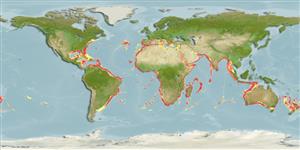Common names from other countries
Elasmobranchii (tubarões e raias) (sharks and rays) >
Squaliformes (Sleeper and dogfish sharks) >
Centrophoridae (Gulper sharks)
Etymology: Centrophorus: centr[um] (L.), prickle or sharp point; phorus, from phoreus (Gr.), bearer or carrier, referring to grooved spines on dorsal fins. (See ETYFish); uyato: uyat or uyato, derived from agullats or ahullats, vernacular for dogfish sharks in the Mediterranean, based on a Mediterranean Squalus (Squalidae), now applied to this gulper shark from the eastern Indian Ocean and north Atlantic. (See ETYFish).
More on author: Rafinesque.
Issue
Discussion on generic placement in Ref. 27638.
Environment: milieu / climate zone / depth range / distribution range
Ecologia
marinhas batidemersal; intervalo de profundidade 50 - 1400 m (Ref. 247), usually 200 - ? m (Ref. 247). Deep-water; 43°N - 43°S
Western Central Atlantic: Gulf of Mexico. Eastern Atlantic: western Mediterranean and Gibraltar to Senegal, Côte d'Ivoire to Nigeria, Cameroon to Angola, northern Namibia. Indian Ocean: southern Mozambique, uncertain records from India; Western Australia (Ref. 6871). Western Pacific: Australia (Ref. 6871); occurrence in Taiwan needs validation. Validity of this species is uncertain (Ref. 27638, not in Ref. 35766).
Comprimento de primeira maturação / Tamanho / Peso / Idade
Maturity: Lm 82.0, range 75 - 89 cm
Max length : 110 cm TL macho/indeterminado; (Ref. 27000); peso máx. publicado: 7.3 kg (Ref. 40637)
Espinhos dorsais (total) : 2; Espinhos anais: 0. A small, slender gulper shark with a long, narrow snout, a short 1st dorsal fin and a high 2nd dorsal fin; pectoral rear tips usually very long; denticles small and flat (Ref. 5578). Brownish-grey above, light grey below (Ref. 5578).
A common deepwater dogfish of the outer continental shelves and upper slopes, on or near the bottom. Adults feed on bony fishes and squid. Males mature by 80 cm TL (Ref. 94782). Ovoviviparous (Ref. 50449). Utilized dried salted for human consumption and probably for fishmeal and liver oil (Ref. 247).
Ovoviviparous, embryos feed solely on yolk (Ref. 50449). Number of young usually only 1. Size at birth between 40 and 50 cm (Ref. 247). Distinct pairing with embrace (Ref. 205).
White, W.T., D.A. Ebert and L.J.V. Compagno, 2008. Description of two new species of gulper sharks, genus Centrophorus (Chondrichthyes: Squaliformes: Centrophoridae) from Australia. pp. 1-21. In P.R. Last, W.T. White and J.J. Pogonoski (eds). Descriptions of new Australian chondrichthyans. CSIRO Marine and Atmospheric Research Paper no. 22. 365 p. (Ref. 76933)
Status na Lista Vermelha da UICN (Ref. 130435)
CITES (Ref. 128078)
Not Evaluated
Ameaça para os humanos
Harmless
Uso pelos humanos
Pescarias: pouco comercial
Ferramentas
Relatórios especiais
Baixar XML
Fontes da internet
Estimates based on models
Preferred temperature (Ref.
115969): 7.3 - 16.7, mean 11.6 (based on 823 cells).
Índice de diversidade filogenética (Ref.
82804): PD
50 = 0.5001 [Uniqueness, from 0.5 = low to 2.0 = high].
Bayesian length-weight: a=0.00251 (0.00161 - 0.00393), b=3.17 (3.04 - 3.30), in cm Total Length, based on LWR estimates for this species & (Sub)family-body (Ref.
93245).
Nível Trófico (Ref.
69278): 4.5 ±0.60 se; based on food items.
Resiliência (Ref.
120179): Muito baixo(a), tempo mínimo de duplicação da população maior que 14 anos (Fec=1).
Fishing Vulnerability (Ref.
59153): High to very high vulnerability (66 of 100).
